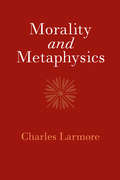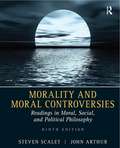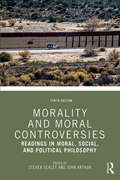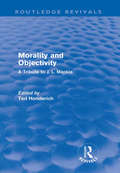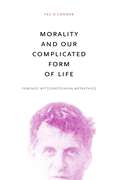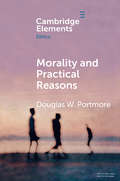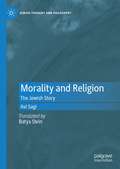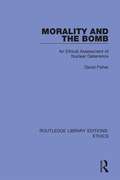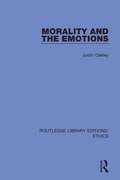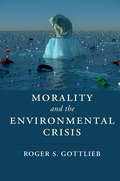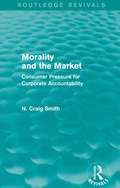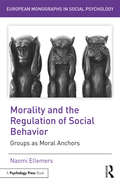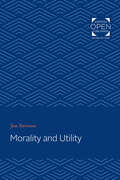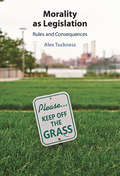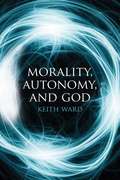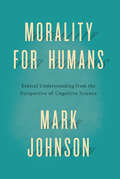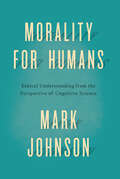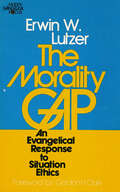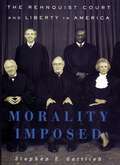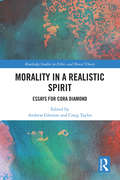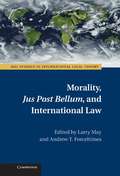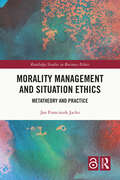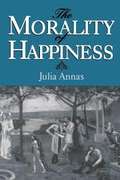- Table View
- List View
Morality and Metaphysics
by Charles LarmoreIn this book, Charles Larmore develops an account of morality, freedom, and reason that rejects the naturalistic metaphysics shaping much of modern thought. Reason, Larmore argues, is responsiveness to reasons, and reasons themselves are essentially normative in character, consisting in the way that physical and psychological facts - facts about the world of nature - count in favor of possibilities of thought and action that we can take up. Moral judgments are true or false in virtue of the moral reasons there are. We need therefore a more comprehensive metaphysics that recognizes a normative dimension to reality as well. Though taking its point of departure in the analysis of moral judgment, this book branches widely into related topics such as freedom and the causal order of the world, textual interpretation, the nature of the self, self-knowledge, and the concept of duties to ourselves.
Morality and Moral Controversies: Readings in Moral, Social and Political Philosophy
by Steven Scalet John ArthurMorality and Moral Controversies provides students with the tools to understand the philosophical ideas that are shaping our world today. This comprehensive anthology includes classic and contemporary readings in moral theory and the most current applied ethics debates emphasizing international concerns. Through analyzing these readings such as Supreme Court decisions, students will grasp the scope of various philosophical discussions Supreme Court justices must have. Morality and Moral Controversies challenges readers to critically assess leading controversies in moral, social, and political philosophy. Upon completing this book, readers will be able to: Understand philosophical ideas that are shaping our world today. Confront conflicts faced when given the choice of morality. Apply various philosophical ideas to politics, religion, economics, relationships, and medicine. Discuss basic philosophical arguments.
Morality and Moral Controversies: Readings in Moral, Social, and Political Philosophy
by Steven Scalet John ArthurMorality and Moral Controversies, 10th Edition challenges students to critically assess today’s leading moral, social, and political issues. As a comprehensive anthology, it provides students with the tools they need to understand the philosophical ideas that are currently shaping our world. The 10th edition includes classic and contemporary readings in moral theory, the most current topics in applied ethics, and updated debates in social and political philosophy. As in the previous nine editions, the materials were selected for balance, timeliness, and accessibility after reviewing a vast range of possible articles from leading scholarly journals, mainstream periodicals, online posts, and book chapters. Hallmarks include carefully edited and philosophically relevant U.S. Supreme Court decisions, compelling readings, and contrasting points of view that reflect a broad ethical and political spectrum. Upon completing this book, readers will be able to: Understand philosophical ideas that are shaping the world today. Apply various philosophical ideas to politics, religion, ethics, economics, personal relationships, medicine, the environment and climate change, warfare, and other areas. Appreciate how to construct, apply, and evaluate basic philosophical arguments. Key updates to the 10th edition include: All material published in the actual book (in contrast to placing sections online behind a paywall, as was the case in earlier editions with a different publisher). New readings on: autonomous warfare self-driving cars the right to health care technology and privacy the value of democracy racial equality immigration.
Morality and Objectivity: A Tribute to J. L. Mackie (Routledge Revivals)
by Ted HonderichThe late J. L. Mackie and his work were a focus for much of the best philosophical thinking in the Oxford tradition. His moral thought centres on that most fundamental issue in moral philosophy – the issue of whether our moral judgements are in some way objective. The contributors to this volume, first published in 1985, are among the most distinguished figures in moral philosophy, and their essays in tribute to John Mackie present views at the forefront of the subject. Five of the essays give a new understanding of the objectivity of moral judgements. These are by Simon Blackburn, R.M. Hare, John McDowell, Susan Hurley and Bernard Williams. The remaining contributors – Philippa Foot, Steven Lukes, Amartya Sen, David Wiggins – give their attention to problems which are equally compelling, such as the defence of a moral outlook based on a conception of a need and of what follows from it. The volume also includes the addresses given by Simon Blackburn and George Cawkwell at the memorial service for John Mackie, and a list of his publications, compiled by Joan Mackie.
Morality and Our Complicated Form of Life: Feminist Wittgensteinian Metaethics
by Peg O’ConnorMoral philosophy, like much of philosophy generally, has been bedeviled by an obsession with seeking secure epistemological foundations and with dichotomies between mind and body, fact and value, subjectivity and objectivity, nature and normativity. These are still alive today in the realism-versus-antirealism debates in ethics. Peg O'Connor draws inspiration from the later Wittgenstein's philosophy to sidestep these pitfalls and develop a new approach to the grounding of ethics (i.e., metaethics) that looks to the interconnected nature of social practices, most especially those that Wittgenstein called “language games.” These language games provide structure and stability to our moral lives while they permit the flexibility to accommodate change in moral understandings and attitudes. To this end, O'Connor deploys new metaphors from architecture and knitting to describe her approach as “felted stabilism,” which locates morality in a large set of overlapping and crisscrossing language games such as engaging in moral inquiry, seeking justifications for our beliefs and actions, formulating reasons for actions, making judgments, disagreeing with other people or dissenting from dominant norms, manifesting moral understandings, and taking and assigning responsibility.
Morality and Practical Reasons (Elements in Ethics)
by Douglas W. PortmoreAs Socrates famously noted, there is no more important question than how we ought to live. The answer to this question depends on how the reasons that we have for living in various different ways combine and compete. To illustrate, suppose that I've just received a substantial raise. What should I do with the extra money? I have most moral reason to donate it to effective charities but most self-interested reason to spend it on luxuries for myself. So, whether I should live my life as I have most moral reason to live it or as I have most self-interested reason to live it depends on how these and other sorts of reasons combine and compete to determine what I have most reason to do, all things considered. This Element seeks to figure out how different sorts of reasons combine and compete to determine how we ought to live.
Morality and Religion: The Jewish Story (Jewish Thought and Philosophy)
by Avi SagiThe relationship between morality and religion has long been controversial, familiar in its formulation as Euthyphro’s dilemma: Is an act right because God commanded it or did God command it because it is right. In Morality and Religion: The Jewish Story, renowned scholar Avi Sagi marshals the breadth of philosophical and hermeneutical tools to examine this relationship in Judaism from two perspectives. The first considers whether Judaism adopted a thesis widespread in other monotheistic religions known as 'divine command morality,' making morality contingent on God’s command. The second deals with the ways Jewish tradition grapples with conflicts between religious and moral obligations. After examining a broad spectrum of Jewish sources—including Talmudic literature, Halakhah, Aggadah, Jewish philosophy, and liturgy—Sagi concludes that mainstream Jewish tradition consistently refrains from attempts to endorse divine command morality or resolve conflicts by invoking a divine command. Rather, the central strand in Judaism perceives God and humans as inhabiting the same moral community and bound by the same moral obligations. When conflicts emerge between moral and religious instructions, Jewish tradition interprets religious norms so that they ultimately pass the moral test. This mainstream voice is anchored in the meaning of Jewish law, which is founded on human autonomy and rationality, and in the relationship with God that is assumed in this tradition.
Morality and Responsibility
by T. M. ScanlonT. M. Scanlon is one of the world’s leading philosophers, widely known for his contractualist moral theory and his distinctive account of moral responsibility and blame. In these important essays, written between 2001 and 2021, Scanlon reflects on the lines of thinking that led him to these views, considers objections to them, and locates them in relation to the views of others, including Derek Parfit, Harry Frankfurt, Gary Watson, and Christine Korsgaard. The result will be essential reading for scholars and students in moral philosophy, political philosophy, and the philosophy of law.
Morality and the Bomb: An Ethical Assessment of Nuclear Deterrence
by David FisherOriginally published in 1985, this book surveys how NATO policy sought to come to terms with the revolution in thinking about war which was brought about by the advent of nuclear weapons. It also examines the logic of deterrence. The book assesses the ethical issues involved, using as a framework the tradition of the idea of the Just War. A detailed modern version of the theory is elaborated and defended from an ethical viewpoint that gives due weight both to the mental states of the agent and to the consequences of his agency. The principle of non-combatant immunity is also examined for its clear relevance to the debate. Further considerations involve the effectiveness of deterrence and its morality, and the question whether deterrence can be effective even if its use is prohibited. The book also discusses the implications of various possible changes in NATO policy.
Morality and the Emotions
by Justin OakleyOriginally published in 1992 this book attacks many recent philosophical and psychological theories of the emotions and argues that our emotions themselves have intrinsic moral significance. He demonstrates that a proper understanding of the emotions reveals the fundamental role they play in our moral lives and the practical consequences that arise from being morally responsible for our emotions.
Morality and the Environmental Crisis (Cambridge Studies in Religion, Philosophy, and Society)
by Roger S. GottliebThe environmental crisis creates an unprecedented moral predicament: how to be a good person when our collective and individual actions contribute to immeasurable devastation and suffering. Drawing on an extraordinary range of sources from philosophy, political theory, global religion, ecology, and contemporary spirituality, Roger S. Gottlieb explores the ethical ambiguities, challenges, and opportunities we face. Engagingly written, intellectually rigorous, and forcefully argued, this volume explores the moral value of nature; the possibility of an 'ecological' democracy; how we treat animals; the demands and limits of individual responsibility and collective political change; contemporary ambiguities of rationality; and how to face environmental despair. In Morality and the Environmental Crisis, Gottlieb combines compassion for the difficulties of contemporary moral life with an unflinching ethical commitment to awareness and action.
Morality and the Market: Consumer Pressure for Corporate Accountability (Routledge Revivals)
by N. Craig SmithCan businesses abandon the axiom that the customer is always right when consumers start questioning the ethics of business practices? Professor Craig Smith examines the theory and practice of ethical purchase behaviour, a crucial mechanism for ensuring social responsibility in business. He explains how and why consumers have used their purchasing power to influence corporate policies and practices. He argues the case for the social control of business, drawing on perspectives from marketing, economics, politics, sociology, and business policy. He concludes that the market may act as an arbiter of ‘good’ and ‘bad’ business practice. Dr Smith considers the practical aspects of ethical purchase behaviour, focusing on consumer boycotts as a specific form of this consumer behaviour, and explains how boycotted businesses should respond. This title, first published in 1990, is ideal for both business students and those who have a business of their own.
Morality and the Regulation of Social Behavior: Groups as Moral Anchors (European Monographs in Social Psychology)
by Naomi EllemersMorality indicates what is the ‘right’ and what is the ‘wrong’ way to behave. It is one of the most popular areas of research in contemporary social psychology, driven in part by recent political-economic crises and the behavioral patterns they exposed. In the past, work on morality tended to highlight individual concerns and moral principles, but more recently researchers have started to address the group context of moral behavior. In Morality and the Regulation of Social Behavior: Groups as Moral Anchors, Naomi Ellemers builds on her extensive research experience to draw together a wide range of insights and findings on morality. She offers an essential integrative summary of the social functions of moral phenomena, examines how social groups contribute to moral values, and explains how groups act as ‘moral anchors’. Her analysis suggests that intragroup dynamics and the desire to establish a distinct group identity are highly relevant to understanding the implications of morality for the regulation of individual behavior. Yet, this group-level context has not been systematically taken into account in research on morality, nor is it used as a matter of course to inform attempts to influence moral behavior. Building on social identity and self-categorization principles, this unique book explicitly considers social groups as an important source of moral values, and examines how this impacts on individual decision making as well as collective behaviors and relations between groups in society. Throughout the book, Ellemers presents results from her own research to elucidate how social behavior is affected by moral concerns. In doing this, she highlights how such insights advance our understanding of moral behavior and moral judgments for of people who live together in communities and work together in organizations. Morality and the Regulation of Social Behavior is essential reading for academics and students in social psychology and related disciplines, and is an invaluable resource for practitioners interested in understanding moral behavior.
Morality and Utility
by Jan NarvesonOriginally published in 1967. In the past half-century, Utilitarianism has fallen out of favor among professional philosophers, except in such "amended" forms as "Ideal" and "Rule" Utilitarianism. Professor Narveson contends that amendments and qualifications are unnecessary and misguided, and that a careful interpretation and application of the original theory, as advocated by Bentham, the Mills, and Sidgwick, obviates any need for modification. Drawing on the analytical work of such influential recent thinkers as Stevenson, Toulmin, Hare, Nowell-Smith, and Baier, the author attempts to draw a more careful and detailed picture than has previously been offered of the logical status and workings of the Principle of Utility. He then turns to the traditional objections to the theory as developed by such respected thinkers as Ross, Frankena, Hart, and Rawls and attempts to show how Utilitarianism can account for our undoubted obligations in the areas of punishment, promising, distributive justice, and the other principal moral convictions of mankind. He contends that the Principle of Utility implies whatever is recognized to be clearly true in these convictions and that it leaves room to doubt whatever is doubtful in them. Narveson concludes with a rationally forceful proof of the Principle of Utility. In the course of this argument, which draws on the most widely accepted recent findings in analytical ethics, Narveson discovers an essential identity between the ethical outlooks of Kant and of Mill, which are traditionally held to be antithetical. Both thinkers, he shows, center on the principle that the interests of others are to be regarded as equal in value to one's own. A new view of Mill's celebrated "proof of utilitarianism" is developed in the course of the discussion.
Morality as Legislation: Rules and Consequences
by Alex Tuckness'What would happen if everyone acted that way?' This question is often used in everyday moral assessments, but it has a paradoxical quality: it draws not only on Kantian ideas of a universal moral law but also on consequentialist claims that what is right depends on the outcome. In this book, Alex Tuckness examines how the question came to be seen as paradoxical, tracing its history from the theistic approaches of the seventeenth century to the secular accounts of the present. Tuckness shows that the earlier interpretations were hybrid theories that included both consequentialist and non-consequentialist elements, and argues that contemporary uses of this approach will likewise need to combine consequentialist and non-consequentialist commitments.
Morality, Autonomy, and God
by Keith WardIn Morality, Autonomy, and God, acclaimed philosopher-theologian Keith Ward argues a strong controversial thesis: that morality is not autonomous, and that theistic morality is deeply rational and of critical importance, especially in modern societies. Referring in detail to contemporary work in moral philosophy, especially where it impinges on religious beliefs, Ward defends the view that certain conceptions of morality depend, in important ways, upon the belief in God. But Ward is careful to argue that the idea of God defended is not necessarily or exclusively Christian. Only in the final chapter does he specifically address problems of morality and Christian doctrine.Academic and rigorous in its approach, and written with characteristic verve, Morality, Autonomy, and God is a significant contribution to the field of moral philosophy and the current debate about the link between religion and morality is today's world.
Morality for Humans: Ethical Understanding from the Perspective of Cognitive Science
by Mark JohnsonWhat is the difference between right and wrong? This is no easy question to answer, yet we constantly try to make it so, frequently appealing to some hidden cache of cut-and-dried absolutes, whether drawn from God, universal reason, or societal authority. Combining cognitive science with a pragmatist philosophical framework in Morality for Humans: Ethical Understanding from the Perspective of Cognitive Science, Mark Johnson argues that appealing solely to absolute principles and values is not only scientifically unsound but even morally suspect. He shows that the standards for the kinds of people we should be and how we should treat one another--which we often think of as universal--are in fact frequently subject to change. And we should be okay with that. Taking context into consideration, he offers a remarkably nuanced, naturalistic view of ethics that sees us creatively adapt our standards according to given needs, emerging problems, and social interactions. Ethical naturalism is not just a revamped form of relativism. Indeed, Johnson attempts to overcome the absolutist-versus-relativist impasse that has been one of the most intractable problems in the history of philosophy. He does so through a careful and inclusive look at the many ways we reason about right and wrong. Much of our moral thought, he shows, is automatic and intuitive, gut feelings that we follow up and attempt to justify with rational analysis and argument. However, good moral deliberation is not limited merely to intuitive judgments supported after the fact by reasoning. Johnson points out a crucial third element: we imagine how our decisions will play out, how we or the world would change with each action we might take. Plumbing this imaginative dimension of moral reasoning, he provides a psychologically sophisticated view of moral problem solving, one perfectly suited for the embodied, culturally embedded, and ever-developing human creatures that we are.
Morality for Humans: Ethical Understanding from the Perspective of Cognitive Science
by Mark JohnsonWhat is the difference between right and wrong? This is no easy question to answer, yet we constantly try to make it so, frequently appealing to some hidden cache of cut-and-dried absolutes, whether drawn from God, universal reason, or societal authority. Combining cognitive science with a pragmatist philosophical framework in Morality for Humans: Ethical Understanding from the Perspective of Cognitive Science, Mark Johnson argues that appealing solely to absolute principles and values is not only scientifically unsound but even morally suspect. He shows that the standards for the kinds of people we should be and how we should treat one another—which we often think of as universal—are in fact frequently subject to change. And we should be okay with that. Taking context into consideration, he offers a remarkably nuanced, naturalistic view of ethics that sees us creatively adapt our standards according to given needs, emerging problems, and social interactions. Ethical naturalism is not just a revamped form of relativism. Indeed, Johnson attempts to overcome the absolutist-versus-relativist impasse that has been one of the most intractable problems in the history of philosophy. He does so through a careful and inclusive look at the many ways we reason about right and wrong. Much of our moral thought, he shows, is automatic and intuitive, gut feelings that we follow up and attempt to justify with rational analysis and argument. However, good moral deliberation is not limited merely to intuitive judgments supported after the fact by reasoning. Johnson points out a crucial third element: we imagine how our decisions will play out, how we or the world would change with each action we might take. Plumbing this imaginative dimension of moral reasoning, he provides a psychologically sophisticated view of moral problem solving, one perfectly suited for the embodied, culturally embedded, and ever-developing human creatures that we are.
The Morality Gap: An Evangelical Response to Situation Ethics
by Erwin W. LutzerWith the conviction that "the gap between traditional morality and the avant-garde approach is widening," Erwin W. Lutzer offers this precise, easy-to-understand, and knowledgeable critique of situation ethics.This presentation adds new insights to the discussion of morality and the ethic of love. Lutzer pinpoints the fallacies of the situationalist's philosophy and offers a biblical alternative that clearly recognizes and deals with moral conflicts.
The Morality Gap: An Evangelical Response to Situation Ethics
by Erwin W. LutzerWith the conviction that "the gap between traditional morality and the avant-garde approach is widening," Erwin W. Lutzer offers this precise, easy-to-understand, and knowledgeable critique of situation ethics.This presentation adds new insights to the discussion of morality and the ethic of love. Lutzer pinpoints the fallacies of the situationalist's philosophy and offers a biblical alternative that clearly recognizes and deals with moral conflicts.
Morality Imposed: The Rehnquist Court and the State of Liberty in America
by Stephen E. GottliebWe like to think of judges and justices as making decisions based on the facts and the law. But to what extent do jurists decide cases in accordance with their own preexisting philosophy of law, and what specific ideological assumptions account for their decisions? Stephen E. Gottlieb adopts a unique perspective on the decision-making of Supreme Court justices, blending and re-characterizing traditional accounts of political philosophy in a way that plausibly explains many of the justices' voting patterns. A seminal study of the Rehnquist Court, Morality Imposed illustrates how, in contrast to previous courts which took their mandate to be a move toward a freer and/or happier society, the current court evidences little concern for this goal, focusing instead on thinly veiled moral judgments. Delineating a fault line between liberal and conservative justices on the Rehnquist Court, Gottlieb suggests that conservative justices have rejected the basic principles that informed post-New Deal individual rights jurisprudence and have substituted their own conceptions of moral character for these fundamental principles. Morality Imposed adds substantially to our understanding of the Supreme Court, its most recent cases, and the evolution of judicial philosophy in the U.S.
Morality in a Realistic Spirit: Essays for Cora Diamond (Routledge Studies in Ethics and Moral Theory)
by Andrew Gleeson Craig TaylorThis unique collection of essays has two main purposes. The first is to honour the pioneering work of Cora Diamond, one of the most important living moral philosophers and certainly the most important working in the tradition inspired by Ludwig Wittgenstein. The second is to develop and deepen a picture of moral philosophy by carrying out new work in what Diamond has called the realistic spirit. The contributors in this book advance a first-order moral attitude that pays close attention to actual moral life and experience. Their essays, inspired by Diamond’s work, take up pressing challenges in Anglo-American moral philosophy, including Diamond’s defence of the concept ‘human being’ in ethics, her defence of literature as a source of moral thought that does not require external sanction from philosophy, her challenge to the standard ‘fact/value’ dichotomy, and her exploration of non-argumentative forms of legitimate moral persuasion. There are also essays that apply this framework to new issues such as the nature of love, the connections of ethics to theology, and the implications of Wittgenstein’s thought for political philosophy. Finally, the book features a new paper by Diamond in which she contests deep-rooted philosophical assumptions about language that severely limit what philosophers see as the possibilities in ethics. Morality in a Realistic Spirit offers a tribute to a great moral philosopher in the best way possible—by taking up the living ideas in her work and taking them in original and interesting directions.
Morality, Jus Post Bellum, and International Law
by Larry May Andrew T. ForcehimesThis collection of essays brings together some of the leading legal, political and moral theorists to discuss the normative issues that arise when war concludes and when a society strives to regain peace. In the transition from war, mass atrocity or a repressive regime, how should we regard the idea of democracy and human rights? Should regimes be toppled unless they are democratic or is it sufficient that these regimes are less repressive than before? Are there moral reasons for thinking that soldiers should be relieved of responsibility so as to advance the goal of peace building? And how should we regard the often conflicting goals of telling the truth about what occurred in the past and allowing individuals to have their day in court? These questions and more are analyzed in detail. It also explores whether jus post bellum itself should be a distinct field of inquiry.
Morality Management and Situation Ethics: Metatheory and Practice (Routledge Studies in Business Ethics)
by Jan Franciszek JackoThis book presents the philosophical assumptions of situation ethics to show the practice of morality management that follows from them. This research comprises theoretical and applied aspects: It is an investigation into metaethics that encompasses strategic and quality management problems. With the example of situation ethics, the book illustrates the role of philosophical investigations and solutions in management theory and practice. It will be of interest to researchers, academics and advanced students in the fields of business and management studies, ethics, quality management and philosophy. Furthermore, this book may be useful for senior executives and politicians charged with negotiating complicated moral quandaries and overseeing the implementation of ethical policies in their organisations and communities.
The Morality of Happiness
by Julia AnnasAncient ethical theories, based on the notions of virtue and happiness, have struck many as an attractive alternative to modern theories. But we cannot find out whether this is true until we understand ancient ethics--and to do this we need to examine the basic structure of ancient ethical theory, not just the details of one or two theories. In this book, Annas brings together the results of a wide-ranging study of ancient ethical philosophy and presents it in a way that is easily accessible to anyone with an interest in ancient or modern ethics. She examines the fundamental notions of happiness and virtue, the role of nature in ethical justification and the relation between concern for self and concern for others. Her careful examination of the ancient debates and arguments shows that many widespread assumptions about ancient ethics are quite mistaken. Ancient ethical theories are not egoistic, and do not depend for their acceptance on metaphysical theories of a teleological kind. Most centrally, they are recognizably theories of morality, and the ancient disputes about the place of virtue in happiness can be seen as akin to modern disputes about the demands of morality.
